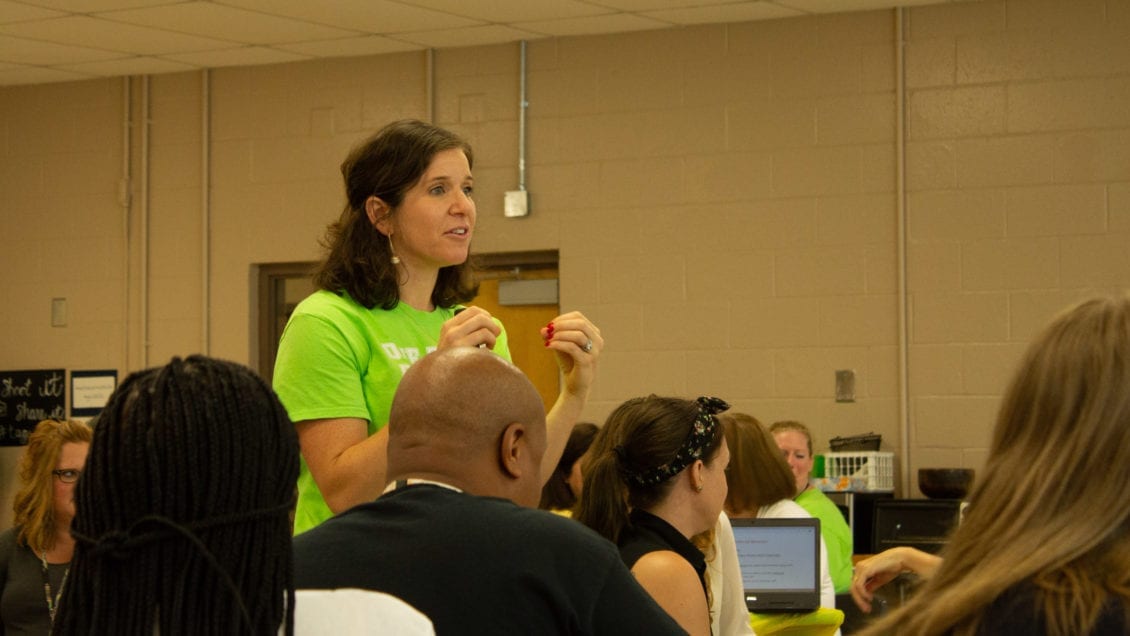
GREENVILLE — Clemson University has partnered with Greenville County Schools on research that will examine the most effective approaches for teachers working with students with emotional and behavioral disorders. The project will start with a four-day training session for special education teachers in summer 2019 and continue with coaching and evaluations during the following academic year.
Researchers plan to structure professional development around established positive classroom behavior supports, which are evidence-based preventative and responsive classroom management strategies designed to promote engagement and reduce inappropriate behavior.
Shanna Hirsch, assistant professor in Clemson’s education and human development department, said the research aims to test an innovative approach to supporting students with behavioral concerns as well as their teachers and families.
“There has certainly been research into what does and doesn’t work for this population of students, but there’s a gap between professional development and its practical application in the classroom,” Hirsch said. “We’re trying to figure out how to best present these practices and make them stick while supporting teachers along the way.”
The researchers know the realities of a special education classroom well; Hirsch is a former special education teacher and she is partnered on the project with Alexis Cash, behavior specialist for Greenville County Schools. Hirsch and Cash will work with 30 special education teachers in grades K-12 from multiple Greenville County schools.
Hirsch said that teachers too often find themselves reacting to students with behavioral problems. The ideal situation is one in which power struggles between teacher and student never occur in the first place. A large portion of the professional development will focus on building teacher knowledge, practice and efficacy. They plan to provide multiple teaching tools, both in student approach and classroom setup to prevent problem behavior and promote pro-social behavior.
Cash said the research should have positive effects on teacher burnout and retention rates in special education classrooms and it comes at a dire time. According to a report from the South Carolina Center for Educator Recruitment, Retention and Advancement, there were 105 vacant special education positions in South Carolina at the beginning of the 2018-19 school year, making it the subject area with the highest amount of vacancies in the state.
“We aren’t just going to say ‘good luck’ after the end of a four-day training session,” Cash said. “We’re giving teachers a comprehensive, long-term vision for their classrooms, and we’ll be supporting and coaching them along the way.”
Cash said another benefit that can’t be overstated is the sense of community that will develop among the teachers involved. She said that often a special education teacher might be the only such teacher in the school, so being around others will provide support, networking opportunities and a big boost to their confidence.
During the first phase of research, Hirsch and Cash will evaluate teacher knowledge and attitudes toward their practice. When teachers enter the classroom, researchers will measure teacher implementation of positive classroom behavior supports as well as student outcomes.
Along the way, researchers plan to provide information sessions for school administrators and students’ families. Hirsch said this part of the plan is crucial for student success.
“To build a culture of acceptance and understanding we would like to make sure everyone is on the same page,” Hirsch said. “Many of these practices double as good parenting tips, so looping in families encourages them to apply these strategies at home.”
Hirsch and Cash said they view this research project as the foundation for something bigger: a preventative approach to the classroom is essential before a teacher can implement more intensive, highly individualized behavior interventions. The researchers hope to expand professional development for teachers to include such interventions.
When discussing the need for this teacher preparation, the researchers said a person need only look at the outcomes of many students with emotional and behavioral disorders. A study from the Regional Educational Laboratory West found that students with emotional and behavioral disorders are the more likely to drop out of school.
“We know that positive learning outcomes are linked to positive life outcomes, so we want to do what we can to turn those negative outcomes around as early as possible,” Hirsch said.
The research is funded by the South Carolina Clinical and Translational Research (SCTR) Institute’s Community Engaged Scholars program at the Medical University of South Carolina. The purpose of the Community-Engaged Scholars Program (CES-P) is to increase the capacity of community-academic partnerships to conduct research with mutual ownership of the processes and products, and ultimately, improve the health of our communities in South Carolina and beyond. A portion of the funding for this research will be used to compensate teachers for the professional development sessions scheduled for the summer 2019.
Get in touch and we will connect you with the author or another expert.
Or email us at news@clemson.edu

